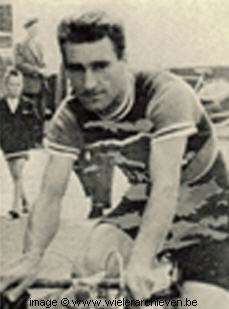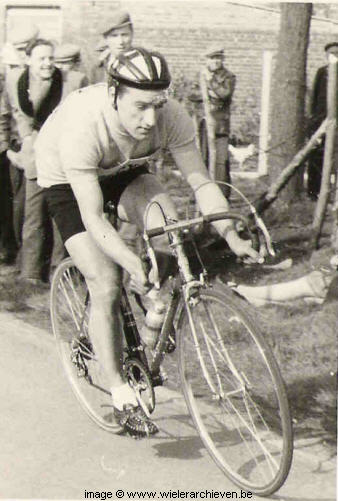July 1960, the GB Tour de France team hotel somewhere in France. Britain’s white hope for Tour de France glory, the late, great Tom Simpson is discussing the events of the day with team mate, Brian Robinson. Simpson had punctured during the stage and one of his GB team domestiques had brought him back up to the bunch; “I’ll tell you what, Brian – that John Kennedy is strong, he was riding like ten men today when we were coming back from that puncture.”
The 1960 season was Scotsman, Kennedy’s fourth as a professional on the continent. He turned pro in 1957, after several successful seasons as an amateur in Belgium. It was just as hard to sign a pro contract then as it is now; there were hundreds of young Belgians keen to stave-off the inevitability of the coal mines or steel works as long as they could. Kennedy rode as a professional for six seasons; with Bertin-d’Alessandro, Bertin-Milremo, Flandria-Wiels, Wiels-Flandria and Bertin-Porter 39.
He didn’t finish the 1960 Tour, abandoning on stage 12. Perhaps if he had been less selfless in his efforts for Robinson and Simpson then he might have made it all the way to Paris. Kennedy had been pre-selected to ride the “Grand Boucle” that year but a bad saddle sore had caused him to withdraw before the final team line-up was decided.
However, the selectors were struggling to fill the eight places assigned to them by the Tour organisation and Kennedy received a telegram at his Belgian home, offering him his place in the world’s biggest bike race, just three days before the start. Kennedy told ‘Sporting Cyclist’ journalist, Russell Galbraith, just before the Lille start;
“It’s a do-or-die attempt, but I am feeling well and have been racing regularly in Belgium.”
In the magazine’s next edition, the ‘Tour Special’, Kennedy gets few mentions. Editor, J.B. Wadley saves most of his copy for Simpson, Robinson and Vic Sutton. It is true that the Glaswegian made few headlines in his one and only Tour and didn’t talk much about the race subsequently; but he did feel that he had been worked hard by Robinson and Simpson for little recognition.
The John Kennedy story is one of “little recognition” and isn’t easy to piece together. Unlike Robinson and Simpson there are no grand palmares to use as navigational aids when charting his career – just six seasons in that toughest of arenas – the Belgian kermesses and semi-classics. Results like tenth in the 1961 Brussels-Charleroi-Brussels don’t make the French results “bibles” like ‘Velo Plus’ but – if you know Belgian bike racing – point to a very solid rider. Kennedy was born in Glasgow 23 May 1931 and died 13 July 1989 aged 58.
When you speak to those who knew him there are common threads running through their memories. A good-looking man, aware and proud of his dark, Mediterranean features; married to a Belgian beauty. Equipment-conscious, only the best components of the day graced his bike and he possessed the skills to hand-build a frame fom scratch. A helpful man, always ready to give advice to fellow-Scots trying their luck against those hard Belgians they had read about in the magazines.

Dedicated in his training and completely at home in Belgium; even owning a business there.
On one of the hard-core Belgian cycling web sites it says; “Kennedy fell in love with Kortrijk”.
He was a “Euro-guy” before the phrase was even invented.
Jimmy Rae from Crieff, still organising League International races some 53 years after he won the West of Scotland junior road race championship in 1953 – the same year as Kennedy won the senior title – seemed like a good man to talk to about this unheralded pioneer.
Rae opened by explaining the background to the era;
“Ian Steele had won the Peace Race in 1952 and in the 1953 the Scottish Cyclists Union was formed, this brought to an end the struggles between rival cycling bodies and a new generation of riders came into being.
“We threw-away our fixed cogs and saddle bags, it was variable gears and Oppy caps for us; we wanted to be like the continental roadmen of the day – there were no “drum-ups” on our training runs.”
He continued;
“After we won those championships we got to know each other and trained together regularly. I think John rode the Circuit of Britain in ’54 and ’55 before he went to Belgium. He raced there for a couple of years as an amateur then turned pro.
“The teams he rode for were properly-structured professional squads, Briek Schotte was the manager at Wiels-Flandria; I guested for them in the Tour of Luxemburg one year. I always felt though that John would have been better going to Italy; he was a climber most of all and I think the racing there would have suited him better.
“He could be a difficult man but was a very dedicated pro, and a great climber. He married a Belgian girl and bought a cafe out there, his in-laws ran it for him. His Belgian wife was a local beauty, the story goes that she used to sit in the cafe and attract the punters in just to look at her.
“I think if he rode now he would be Pro Tour material but like I said, Belgium was difficult for him. When he rode that Tour he did well in the early stages because he knew how to ride in the big bunches. He rode the kermesses every second day but he maybe wasn’t as motivated that year as he had been. His performances weren’t that well recognised back in Scotland, it was still very much time trial biased back then.
“He was a competent welder, he made the Milano frames for John Robertson of Govan for a while. He was what you would call “image conscious”, I remember him saying to me once; “the only thing that’s worse than feeling bad on a bike, is looking bad on a bike!”I think he settled somewhere near Portsmouth after he retired as a rider. If I had to sum him up as a rider ? Dedicated!”

Edinburgh architect, Dave Meek is another man with vivid memories of Kennedy;
“I spent a year in Courtrai (or Kortrijk in Flemish) with a couple of friends when I was 19 or 20. Our digs were right across the square from Kennedy’s cafe and we were over there most days. He had finished racing by then but he used to sit and talk to us and try and give us a bit of guidance. We would buy a paper and look at what races were on then decide where we would ride that day. He would say to us things like; “have you thought about how far away that is?” or maybe tell us about the course. He would also sell us some of his old kit, tubs and shorts for example, at knock-down prices.
“He didn’t say much about the Tour or classics but he rode against the best riders of that generation in the kermesses, he would say; “I was on Van Steenbergen’s wheel this time and… ” He was suited to that type of racing – stocky and strong.
“He struck me as being Belgian, his French was fluent. He was a nice guy and helped us as much as he could. Back in those days there was just no help available at all.
“He was one of a breed of very tough men who went out there with absolutely no one to ask for guidance. When I think about it, he must have been one of the very first. In Scotland he received pretty-much zero recognition but he was a good rider, a hardy guy.”
Robert Millar, Billy Bilsland – respect ! But let’s not forget John Kennedy and we’ll leave the last word to Tony Hewson, from his wonderful book, ‘In Pursuit of Stardom.’
“Above all, ‘chapeau’ to the Scot, John Kennedy, who trained day in and day out on the pave with former world champion, Brik Schotte. John married a Belgian girl and became resident in Kortrij.
“Only love could have prompted him to abandon the lovely lochs and heathery hills of his native Scotland for that industrialised Hell of the North.”



